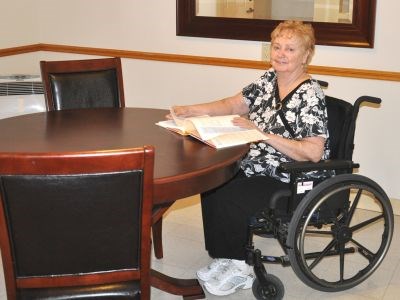One night about five years ago, Jacqueline Lepine woke up at around 2:30 a.m. to go to the washroom, and knew right away she didn't feel right.
“I told my husband 'There's something wrong with me, Will, but I can't explain it,'” she said.
It turned out Lepine, now 72, was having a stroke. She ended up in the hospital in a coma. When she woke up, one side of her body was paralyzed, and she felt like she was in a daze.
“Then I started to come to life a little bit, and I tried to work very hard on myself to see if I could get better,” she said.
Through intensive rehabilitation, Lepine regained some of the function in her body, and was finally able to go home.
Starting in 2008, she has received support from the Independence Centre and Network (ICAN), attending one-on-one exercise sessions, as well as participating in the organization's stroke peer support and educational groups.

Jacqueline Lepine lives in ICAN's Post Stroke Transitional Care Unit, where she is learning to care for herself after having a stroke. Supplied photo.
Then, this past fall, ICAN opened its new Post Stroke Transitional Care Unit at its Brennan Street location as part of a pilot project.
The four-bedroom shared apartment caters to stroke survivors who are transitioning from a hospital stay to their own homes or to a long-term care facility, need more practise with the activities of daily living or need a place to stay to provide their caregivers with some respite.
Lepine, whose husband passed away from cancer in 2010, was one of the first clients to come to stay in the new facility when it opened this past September.
She stayed there until Nov. 18, and then moved back into her own home. However, after about a month, she contacted ICAN and asked to move back into the facility.
Lepine is now on the waiting list for permanent supportive housing run by ICAN.
“After my husband died, I didn't know where I was going to go, and didn't know what I was going to do,” Lepine said. “When you lose your husband, you kind of lose your life. But things aren't too bad, because I'm here.”
She said she feels at home at ICAN.
“People are very, very nice here,” she said. “They're friendly. I love it here.”
She shows visitors around the apartment, demonstrating how everything from the sink to the shower to the washer and dryer are accessible to her in her wheelchair.
Lepine said she's working with the ICAN team to improve her ability to do things for herself so she'll be ready to move into permanent supportive housing.
In the meantime, though, she said she'd love a few roommates, as she's currently the only person living in the Post Stroke Transitional Care Unit.
“If we get a few more people, we'll all be a bit happier,” Lepine said. “If you want to make Jacquie happy, why don't a couple of other people come here? If they've had a stroke, I can help them. I might not be able to do very much, but I can tell them my story.”
Rebecca Bowes, stroke community navigator with ICAN, said those in the stroke unit are checked on by staff several times a day, and wear a pendant they can push to summon staff at any hour in the case of emergencies.
When clients first move in, they're assessed by an occupational therapist, physiotherapist and rehabilitation support workers to see what their needs are, and to develop goals to improve their function, she said.
Clients have access to a number of programs, including one-on-one exercise, a living with stroke support group, a horticultural therapy group and a food safety and preparation group.
Staff are available to assist with the activities of daily living, including meal preparation and planning, bathing, hygiene, housekeeping, dressing, feeding, toileting and transfers.
If the individual is able to do something independently, they're encouraged to do so, but help is available should they need it.
It costs $35 a day to stay in the facility, Bowes said.
“All of their food is purchased for them, as well as their laundry soap, dishwasher detergent and household cleaning supplies,” she said. “Their bed linens are included as well. They just have to bring their personal toiletries.”
Bowes said the facility has the potential to reduce alternate level of care (ALC) patient pressures at Health Sciences North, because it allows stroke survivors to leave the hospital sooner.
Those interested in learning more about the Post Stroke Transitional Care Unit are invited to phone ICAN at 705-673-0655.
Stroke statistics:
- Four hundred fifty people have strokes in Greater Sudbury every year.
- One stroke occurs every 10 minutes in Canada, adding up to 50,000 strokes annually.
- Strokes cost about $4 billion every year in physician services, hospital stays, lost wages and decreased productivity.
- Forty to 50 per cent of individuals who have had a stroke develop depression as a result.
(Source: Heart and Stroke Foundation of Canada)
Posted by Arron Pickard
